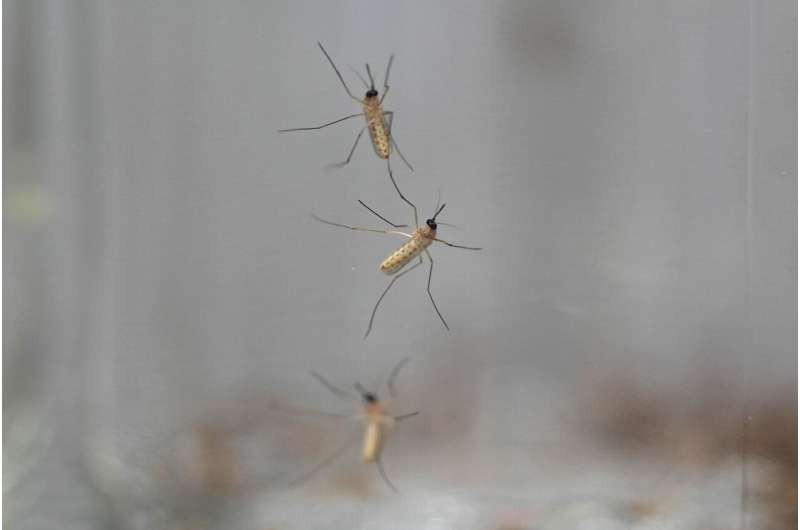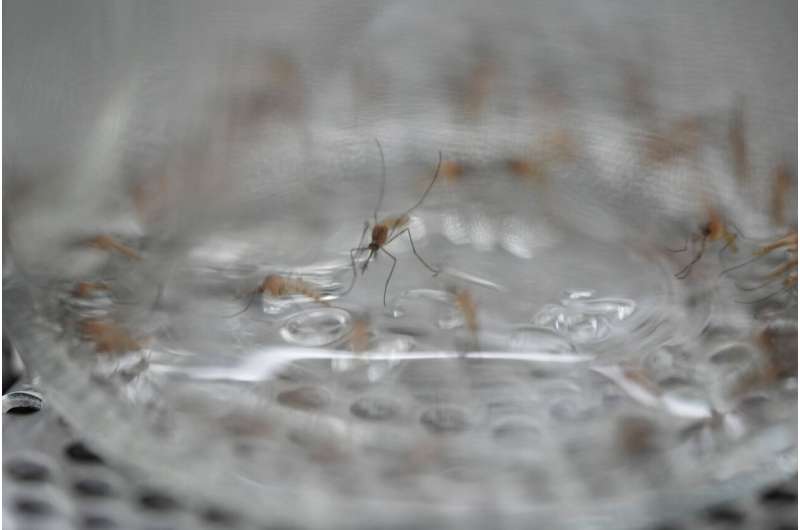
Mosquitoes cling to the inside of a jar loaded with repellent during a test as part of a tour of the Center for Disease Control laboratory, Thursday, April 4, 2024, in Fort Collins, Colo. Credit: AP Photo/David Zalubowski
There’s an old joke that mosquitoes are like family: They are annoying, but they carry your blood.
Mosquito season is starting to rev up across much of the United States. And that means bug bites.
When a mosquito bites you, it pierces the skin using a mouthpart called a proboscis to suck up blood. As it feeds, it injects saliva into your skin that can cause a reaction—a bump and itching. But the pests can also spread parasites like malaria and viruses like dengue, West Nile and Zika.
So you might want to pause summer vacation planning and consider what to look for in repellents, which keep bugs away from you, and insecticides, which kill them.
WHAT MOSQUITO REPELLENTS WORK BEST?
The Centers for Disease Control and Prevention says that for protection that lasts hours, people should look for ones with these active ingredients: DEET, IR3535, picaridin, or oil of lemon eucalyptus. Those ingredients are registered with the Environmental Protection Agency.
A note about oil of lemon eucalyptus: Lemon eucalyptus essential oil has a similar name, but the agency does not recommend it because it hasn’t been tested for safety and is not registered with EPA as an insect repellent.
Likewise, the CDC doesn’t endorse other “natural” products that haven’t been evaluated.

Nicole Foley checks a bottle to see the condition of mosquitoes exposed to a particular insecticide as part of a test during a tour of the Center for Disease Control laboratory, Thursday, April 4, 2024, in Fort Collins, Colo. Credit: AP Photo/David Zalubowski
WHAT OTHER STEPS CAN YOU TAKE TO AVOID MOSQUITO BITES?
Repellents are one line of defense against bugs, but there are others: Wear long sleeves and long pants. Avoid going out at dusk and dawn, when some types of mosquito tend to be most active.
Silvie Huijben, an evolutionary biologist at Arizona State University, helped develop an online game to help children understand how to protect against mosquitoes, which emphasizes another prevention strategy:
“Mosquitoes need water to breed in,” so it’s important to make sure to get rid of standing water—including buckets of water or kiddie pools left undisturbed in the yard for a week or more, she said. “Make sure you’re not the one contributing the local mosquito problem, that you’re not breeding mosquitoes on your property.”
You can also treat clothes and outdoor gear with a pesticide called permethrin to ward off mosquitoes and other unwelcome pests.
HOW INSECTICIDES ARE TESTED
The Centers for Disease Control and Prevention operates a mosquito lab in Fort Collins, Colorado, where it evaluates insecticides, but not repellents.
To test these kinds of products, the researchers coat the inside of a bottle with a given dose of an insecticide ingredient, then put mosquitoes in the bottle—usually about 25. They see what percentage of the bugs die within two hours and compare that with a nearby uncoated bottle containing the same number of mosquitoes.
The test is widely used in the U.S. and also is increasingly used around the world. It is considered simpler and less expensive than some more complicated alternatives, including a test in which insecticide drops are applied directly to mosquitoes.

A mosquito sits in the bottom of a bottle containing a particular insecticide as part of a test during a tour of the Center for Disease Control laboratory Thursday, April 4, 2024, in Fort Collins, Colo. Credit: AP Photo/David Zalubowski
Scientists typically repeat the experiments each season to document changes in how the mosquitoes respond to insecticides, CDC officials say.
Huijben said repeating the test is important because it has limitations: Results can be thrown off by factors such as whether each bottle was coated with exactly the same amount of chemical.
“I think we’re seeing a lot of noise in the data” which may lead to false initial conclusions, said Huijben, who has compared resistance testing approaches.
ARE MOSQUITOES BECOMING RESISTANT TO SOME CHEMICALS?
Just like bacteria can gradually develop the ability to shrug off antibiotics, bugs can develop resistance to some of the chemicals developed to kill and repel them.
Permethrin belongs to a class of insecticides called pyrethroids, which have shown this kind of resistance.
Pyrethroids grew popular in the 1990s as replacements to older pesticides and are commonly used to control adult bugs. Community mosquito-control programs and farmers use the chemicals, but homeowners can also find them on hardware store shelves.
In lab experiments, resistance varies by product and dose, but in some tests “none of them (mosquitoes) will die,” said Roxanne Connelly, a CDC insect scientist.
CDC officials are working with state and local officials to do more real-world field testing, including experiments in which mosquitoes placed in cages outdoors are checked after an insecticide fogging truck passes by.
© 2024 The Associated Press. All rights reserved. This material may not be published, broadcast, rewritten or redistributed without permission.
Citation:
What to look for in mosquito repellents (2024, May 25)
retrieved 26 May 2024
from https://medicalxpress.com/news/2024-05-mosquito-repellents.html
This document is subject to copyright. Apart from any fair dealing for the purpose of private study or research, no
part may be reproduced without the written permission. The content is provided for information purposes only.
>>> Read full article>>>
Copyright for syndicated content belongs to the linked Source : Medical Xpress – https://medicalxpress.com/news/2024-05-mosquito-repellents.html










